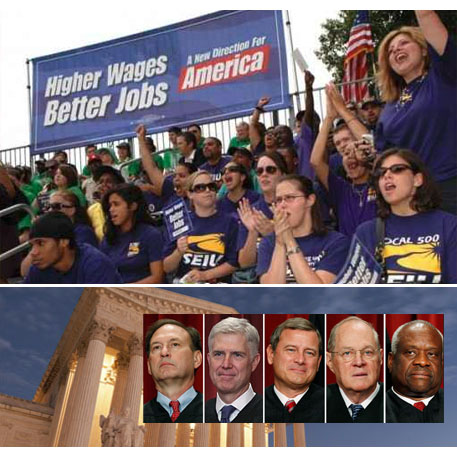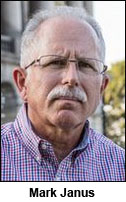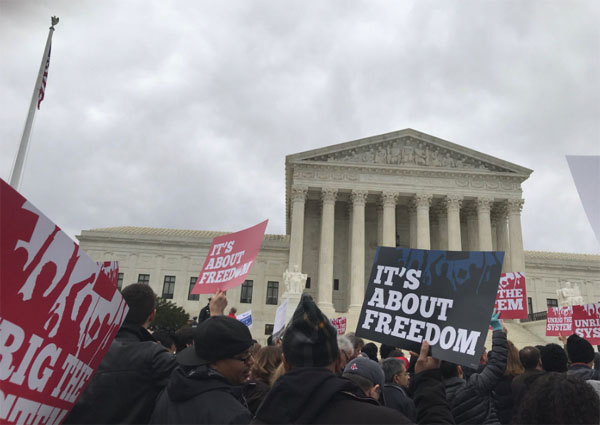OPINION
Janus (Part 1): The fix is in at the Supreme Court
By DAVID GROVES
Editor of The Stand
Part 1 of 2
 (March 6, 2018) — It couldn’t be more clear. The fix is in.
(March 6, 2018) — It couldn’t be more clear. The fix is in.
After hearing oral arguments in Janus v. AFSCME last week, the U.S. Supreme Court is poised to ignore its institutional principles to deliver an orchestrated body blow to America’s labor movement.
The court will ignore stare decisis, the fundamental legal principle that it shouldn’t just change its mind and reverse previous decisions because its ideological bent has shifted. Things like facts and new evidence are normally needed to demonstrate that a previous decision was unjust or unworkable before the court takes the radical step of overturning 40-plus years of legal precedent and disrupting union contracts covering millions of Americans.
There are no new facts in the Janus case. In fact, there is no record at all.
There’s no evidence that the court’s unanimous 1977 Abood decision, which allowed public employees to opt out of union membership and dues-paying, has proven unworkable or unjust. Public employees and unions in free-bargaining states like Washington, which have no “Right to Work” laws, have functioned just fine in the decades since Abood. Public employees have been allowed to determine for themselves whether they want to require everyone who benefits from their union contract, including those who withdraw from membership, to pay their “fair share” to help cover the cost of negotiating and maintaining the contract. Washington’s governor and attorney general agree and have strongly urged the Supreme Court to uphold Abood.
Never mind that.
 MEET MARK JANUS. He’s a child support specialist for the Illinois Department of Healthcare and Family Services. He has exercised his right under Abood to withdraw from the union and not be a member, but by law, AFSCME Council 31 must still represent him.
MEET MARK JANUS. He’s a child support specialist for the Illinois Department of Healthcare and Family Services. He has exercised his right under Abood to withdraw from the union and not be a member, but by law, AFSCME Council 31 must still represent him.
Under his union contract, Janus makes $71,000 a year in a state where both the average pay for social work and the statewide median income is less than $60,000. He also earns time-and-a-half for working overtime. Almost every year he gets a step pay increase and/or cost-of-living increase. He gets paid holidays and paid vacation time. He gets his choice of several health care plans and is also eligible for retiree health care coverage. He gets paid sick leave and paid paternity leave. He is eligible to receive a defined-benefit pension that, when he retires, will pay him a portion of his salary for the rest of his life. He has job security and the peace of mind that if some manager violates his rights or tries to fire him without cause, the union will represent him to protect his job and his family.
That job would be a dream come true for most social workers — and for most Americans. Thank you, AFSCME!
And for all that, Janus pays a fair-share fee of $45 per month to the union, about what the average American pays for a gym membership. None of his money goes to political campaigns, or lobbying, or any other community and charitable activities his union is involved in. Just the contract. What’s unjust or unworkable about that, you ask?
Janus and his pro bono attorneys with the National Right-to-Work Foundation, which is funded by the Koch brothers and other right-wing billionaires’ foundations, argue that $45/month violates his First Amendment rights. You see, Janus doesn’t like that his union tries to negotiate for better wages and benefits on his behalf when the state is struggling financially. Therefore, he is being compelled to speak (remember: money equals speech now in America) in support of something political, they say. That means everything a public employee union does is political, they say.
You see how dumb that is? And they are going to win this case!
SO UNLESS ANOTHER one of them unexpectedly drops dead at an exclusive five-star resort in the next few months, the Supreme Court’s five conservative justices will ignore their professed aversion to judicial activism and creeping federalism by siding with Janus and imposing Right to Work restrictions on all public employees nationwide, probably in June. All state and local governments and all public employee unions will be banned from agreeing to fair-share provisions in their contracts, and the unions will be required to represent non-members, even if they don’t pay a penny to support the effort.
Because… free speech for free riders!
There was some press speculation about newbie Justice Neil Gorsuch’s silence at last week’s oral arguments. Could it mean he might side with unions? Not a chance. So far he has voted 100 percent of the time with the court’s most conservative member, Justice Clarence #HimToo Thomas. And there is no indication that any of the four conservatives who voted against unions in the nearly identical Friedrichs case that tied 4-4 in 2016 have changed their minds.
In fact, the whole scheme was Justice Samuel Alito’s idea. During arguments both he and Justice Anthony Kennedy, the guy many consider to be the moderate in this cadre of right-wing ideologues, went on Hannity-style rants about unions advocating for “massive government” and “increased taxes.” The unusual break from decorum (and the pretense of objectivity) had Linda Greenhouse, the respected court analyst for The New York Times, wondering “what could have permitted their intense dislike of organized labor to strip them of judicious inhibition and drive them to act as advocates and even something very close to bullies.”
Nope. There’s little drama here. This Janus case, manufactured and financed by the same conservative billionaires who decide how much health care you get and how little taxes they pay, will be decided 5-4 against the unions.
America, a nation that already has among the lowest levels of union representation of any country that allows unions, a nation that has such weak and outdated labor laws that other countries complain its union suppression violates international trade principles, a nation that the watchdog Human Rights Watch already lists alongside third-world dictatorships as violating its workers’ freedom of association, will make it even harder for its citizens to join together in strong unions to negotiate better wages and working conditions.
So, then what? Stay tuned for Part 2 tomorrow…
David Groves is the Editor of The Stand and the Communications Director of the Washington State Labor Council, AFL-CIO. This is the first of a two-part series on the Janus decision and how it will affect the labor movement in Washington state. See Part 2 — Janus: Get ready to defend your freedom.






